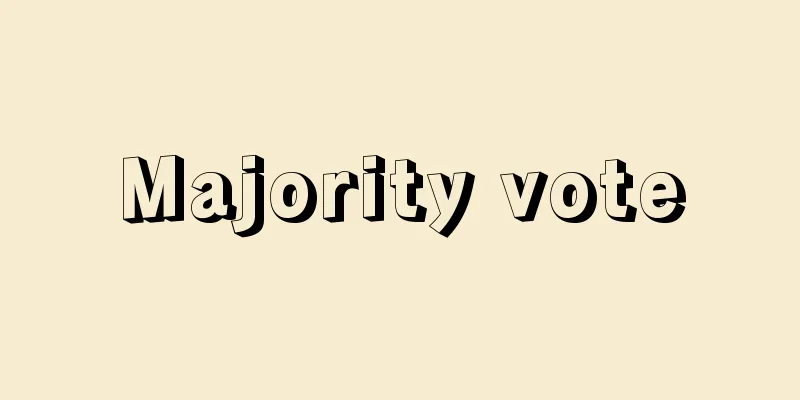Majority vote

|
A method of deciding the will of a group or conference in which a decision that is approved by the majority of the members is recognized as the will of the whole. Today, most decisions are made by majority vote. A term that is the opposite of unanimity. [Hiroshi Tanaka] Majority vote and unanimityIt is said that the adoption of majority rule in the political world began with the medieval English Parliament. In England, the majority rule system used in court decisions was adopted as the method of decision-making in Parliament. As a result, even if there were delays in the deliberation process, Parliament was ultimately able to decide its will. In contrast, the French Estates' Parliament, the Three Estates General, adopted a unanimous decision system, which made it difficult for Parliament to decide its will, paralyzing Parliament's function as a deliberative body, and as a result allowing the rise of royal power. In principle, unanimity is desirable when deciding the will of a conference body, but when there is a strong conflict of interest between the estates and classes, it is almost impossible to make a decision by unanimity. Therefore, since the establishment of modern parliaments, most countries have adopted a majority rule system for parliamentary decisions. The League of Nations adopted a unanimous decision system, which meant that effective decisions could not be made, and this is said to have been one of the reasons for the League's collapse, so the United Nations adopted a majority rule system. However, when it comes to the issue of maintaining international peace, it is virtually meaningless unless the will of the five major powers is unanimous, so the five permanent members of the Security Council were given a veto, which essentially means unanimity. However, as the conflict between the United States and the Soviet Union intensified, both sides exercised their vetoes, paralyzing the Security Council's functions. As a result, a system was adopted whereby an emergency special session would be held to deal with the issue of maintaining international peace and security if the Security Council's functions became paralyzed, and a majority vote of all member states would be used to resolve the issue. [Hiroshi Tanaka] Majority Rule and DemocracyThis does not mean that every majority decision is a democratic one. But why has majority rule come to be regarded as almost the same as democracy today? This is because the modern view of humanity was advocated after the civil revolution, and this view is based on the premise that all human beings are born free and equal, and that all human beings are rational beings. Only on the premise of such a rational and homogeneous view of humanity can we hypothesize that people can reach rational and democratic conclusions in parliamentary debates, and that the majority opinion is in principle superior to the minority opinion. Therefore, in a majority rule system, it is necessary to at least guarantee the principle that sufficient debate is held and that the minority opinion is fully respected. Any decision made by "forced vote" is nothing but the tyranny of the majority, and is far from being a democratic decision. In any case, the principle of democratic political administration was established when a modern parliament with a representative character that advocated debate and openness was combined with majority rule, replacing the secrecy and autocratic system of the absolute monarchy era. This way of thinking was first seen in the political thought of Hobbes. He advocated that rational people should enter into a contract to better guarantee the safety of their lives and establish a community with one power, i.e. the state, but he also allowed the use of majority vote when selecting representatives to run that political society. Thus, majority vote was positioned as the basic method of democratic political management in modern states. Locke, who is said to be the father of the idea of parliamentary democracy, naturally took majority vote to be self-evident. However, in the early modern period, limited suffrage was adopted, so majority vote was in reality merely a majority among those who represented minorities. In order to overcome this political fiction, Rousseau's theory of the "general will" advocated the participation of everyone in politics, and Bentham, a contemporary of Rousseau's, advocated the principle of "the greatest happiness of the greatest number" and "one person, one vote". The realization of universal suffrage filled the gap between majority vote and democracy. [Hiroshi Tanaka] Criticism of the Majority Rule System in FascismFascism, which emerged in the 1920s and 1930s in the 20th century, aimed to establish a dictatorial state under strong political leadership in order to counter imperialist powers and Soviet socialism, and criticized and attacked parliamentary and majority rule systems for not truly representing the interests of the entire nation. Since it was a time of political turmoil immediately after World War I and an unprecedented economic crisis, the logic of fascism attracted people from the middle and lower classes. In response to this, British political scientist Laski pointed out that parliament in effect represented the interests of the propertied class, but he also argued that people who could truly represent the interests of the entire nation should be sent to parliament and that policies should be changed peacefully through debate. The political situation of the 1920s and 1930s teaches us that majority rule cannot fulfill a democratic function in a country where democracy is not fully established. [Hiroshi Tanaka] Source: Shogakukan Encyclopedia Nipponica About Encyclopedia Nipponica Information | Legend |
|
ある集団や会議体の意志を決定する場合、構成員の多数が賛成した決定を全体の意志として認める方式。今日では、ほとんどの場合、決定に際しては、この多数決制が採用されている。全会一致制に対する語。 [田中 浩] 多数決と全会一致制政治の世界において多数決制を採用したのは中世イギリス議会に始まるといわれる。イギリスでは、裁判所の判決における多数決制を議会の決定方式に採用した。このため、審議の過程で手間どることがあっても最終的には議会の意志を決定することができた。これに対し、フランスの身分制議会=三部会では、全会一致制を採用していたため、議会の意志を決定することが困難で、審議機関としての議会の機能が麻痺(まひ)し、その結果、国王権力の台頭を許すことになった。本来、会議体の意志を決定する場合には全会一致が望ましいが、諸身分・諸階級の利害対立が激しい場合には、全会一致制による決定はほとんど不可能である。したがって、近代議会の成立以後においては、ほとんどの国々で、議会の決定に関しては多数決制を採用するようになった。国際連盟では議事の決定は全会一致制をとったため、有効な決定ができず、そのことが国際連盟崩壊の一因となったといわれ、国際連合においては多数決制が採用された。ただ、国際平和の維持という問題については、五大国の意志が一致しなければ事実上無意味だということで、安全保障理事会の5常任理事国にいわば全会一致制を意味する拒否権が与えられた。しかし、米ソの対立が激化するなかで、双方から拒否権が発動され、安全保障理事会の機能が麻痺(まひ)した。そこで、国際的な平和と安全の維持に関し、安全保障理事会の機能が麻痺した場合には緊急特別総会を開き、全加盟国の多数決によって問題の処理にあたる、という方式が採用された。 [田中 浩] 多数決と民主主義多数決であれば、ただちにそのすべてが民主主義的な決定である、というわけではない。しかし、今日、多数決がほとんど民主主義と同一視されるまでになった理由は何か。これは、市民革命後、近代的な人間観が主張されるようになってからであり、近代的人間観においては、人間はすべて生まれながらにして自由で平等な存在であり、かつ人間はすべて理性的存在である、という考えを前提としている。このような合理的・同質的人間観を前提にして初めて、議会の討論において、人々は合理的かつ民主的な結論に到達し、多数意見は少数意見よりも原則的には優れているという仮説が成り立つであろう。したがって、多数決制においては、十分な討論がなされ、少数意見が十分に尊重されるという原則が最低限保障されることが必要であって、いやしくも「強行採決」などによる決定は多数の横暴以外のなにものでもなく、民主的な決定とはほど遠いものといえよう。ともあれ、絶対王制時代のような秘密・専決制にかわって、討論と公開制を標榜(ひょうぼう)する国民代表的性格をもった近代議会と多数決制が結び付いたときに、民主主義的な政治運営の原理が確立されたのである。 こうした考え方は、最初にホッブズの政治思想にみられる。彼は、理性的な人間が生命の安全をよりよく保障するために契約を結び、一つの権力をもつ共同体=国家を設立することを説いたが、その政治社会を運営する代表を選ぶ際には多数決の採用を認めているからである。ここに、多数決は近代国家における民主的な政治運営の基本的方法として位置づけられたのである。続く議会制民主主義思想の祖といわれるロックは、当然のことながら、多数決制を自明の理としているのである。ところで、近代初期においては制限選挙制をとっていたから、多数決といっても現実には少数者を代表する人々の間での多数にすぎなかった。この政治的擬制(フィクション)を克服するために、政治への全員参加を主張したのが、ルソーの「一般意志」論であり、またルソーの同時代人で、「最大多数の最大幸福」原理と「1人1票制」を主張したベンサムであった。普通選挙制の実現は、多数決制と民主主義との間隙(かんげき)を埋めた。 [田中 浩] ファシズムの多数決制批判20世紀の1920、30年代に登場したファシズムは、帝国主義列強とソ連社会主義に対抗するため、強力な政治指導による独裁制国家の確立を目ざし、議会制と多数決制は全国民の利益を真に代表していないとして批判・攻撃を加えた。当時は第一次世界大戦直後の政治的混乱期、未曽有(みぞう)の経済的危機の時代であったから、ファシズムの論理は中産階級や下層階級の人々をひきつけた。これに対し、イギリスの政治学者ラスキは、議会が事実上有産者階級の利益を代表していることを指摘しながらも、真に全国民の利益を代表しうる人々を議会に送り込み、討論を通じて平和的に政策を転換させるよう主張した。一国における民主主義が十分に確立していないところでは、多数決は民主主義的な機能を果たしえないことを、1920、30年代の政治状況はわれわれに教えている。 [田中 浩] 出典 小学館 日本大百科全書(ニッポニカ)日本大百科全書(ニッポニカ)について 情報 | 凡例 |
Recommend
Wrocław (English spelling)
Wrocław is the central city of the Lower Silesian...
Wurtzite - Urutsukou (English spelling) wurtzite
A zinc sulfide mineral (ideal chemical composition...
Fundoshi celebration - Hekoiwai
In Kyushu, a coming-of-age ceremony is held for bo...
Technological process
In a broad sense, production can refer to self-su...
White Deer Cave Academy (English: White Deer Cave Academy)
A school in the Song Dynasty in China. Lushan Wula...
Karancha, A.de - Karancha
…The cronicas that focus exclusively on culture a...
Omote Nikko - Omote Nikko
...It is located in the southern part of the Nikk...
Letters from an American Farmer
…He was born to a minor nobleman in Normandy, Fra...
Narayana (personal name)
...Pātā is a collection of completely mechanical ...
Brown spider shell - Brown spider shell
…However, if you put the calcareous shells in vin...
Planting calculation - Uekizan
A problem involving applied arithmetic, in which t...
Dickinson, J.
…For this reason, the Fourdrinier paper machine i...
Wojciech Męcinski
1598‐1643 Polish Jesuit priest. Martyred in Nagasa...
On Kawara
Born January 2, 1933 in Kariya, Aichi [Died] July ...
Agricultural statistics
A general term for statistics related to agricultu...





![Arizona [State] - Arizona](/upload/images/67cadcbd2b797.webp)


![Aso [Hot Springs] - Aso](/upload/images/67cf2c6d60356.webp)
